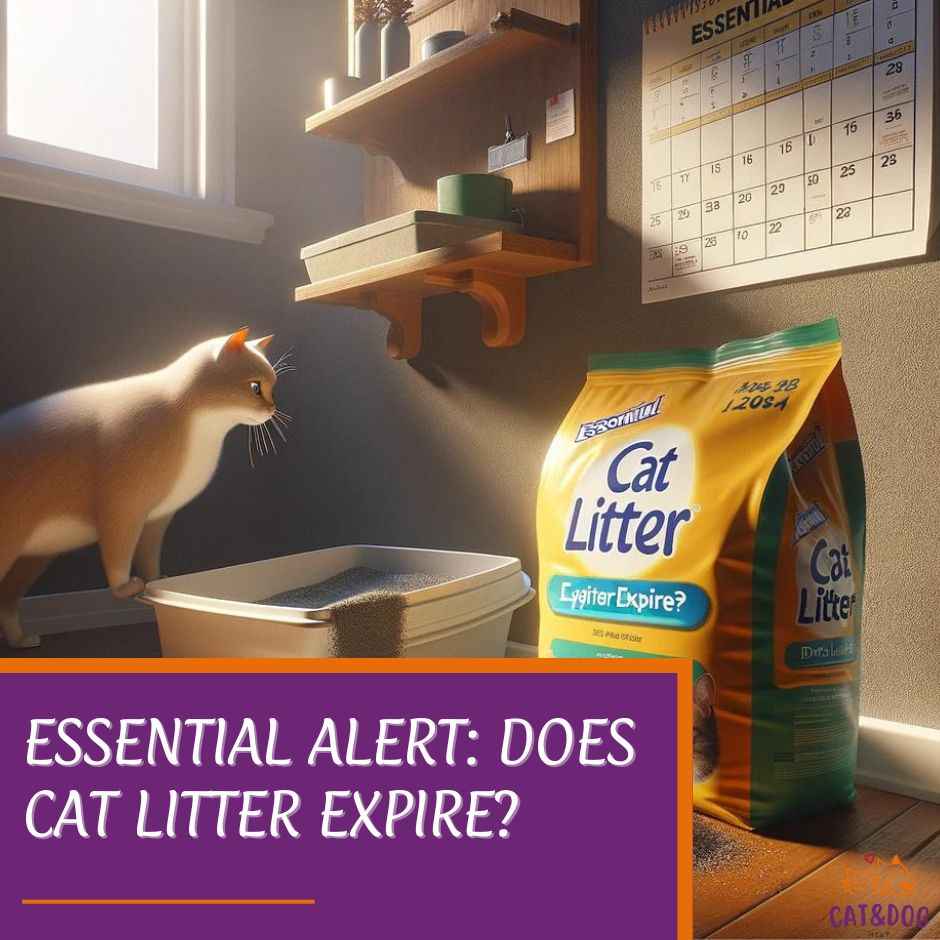Pet parents, you might ever wondered if your cat needs, cat litter can’t be used anymore. “Does Cat Litter Expire?”
It’s an important question, considering that a clean and effective litter box is essential for the health and hygiene of your feline friend. (1)
While cat litter may not spoil like food, it can certainly lose its effectiveness over time. This is why understanding its shelf life can save you from foul smells and potential mishaps.
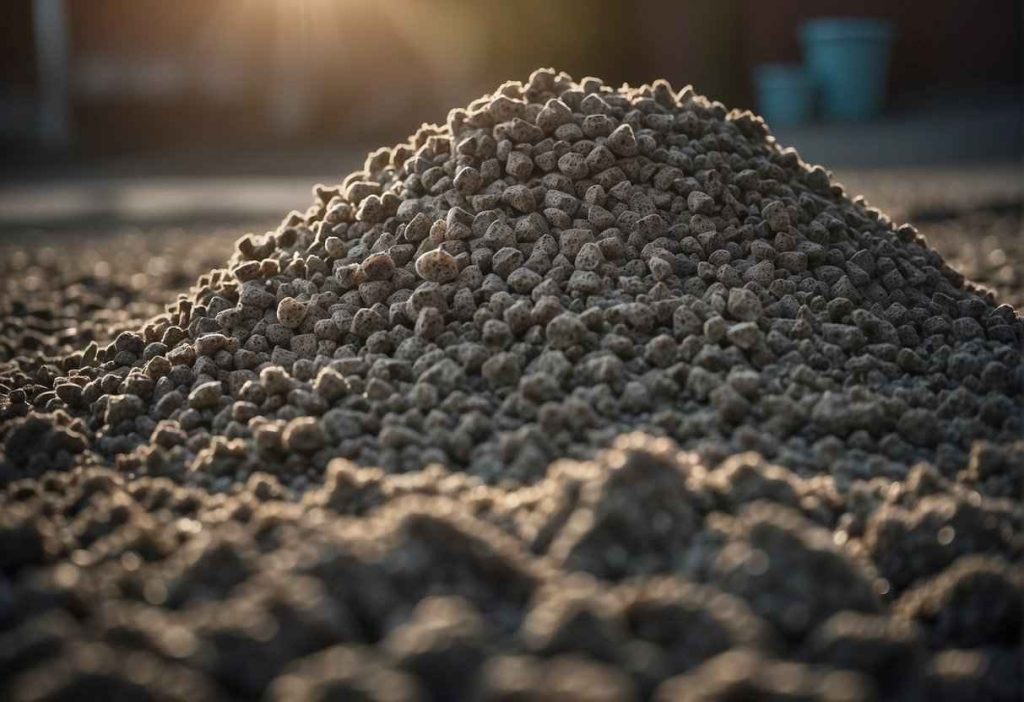
Knowing how to store cat litter properly could also extend its usability, ensuring that you get the most bang for your buck.
Different types of cat litter have various longevity factors, and getting to grips with this could mean your cat litter stays fresh and functional as long as possible.
Whether you’ve got a bag that’s been sitting in the cupboard for months or you’re simply planning to stock up, being aware of the nitty-gritty details will keep your litter box in top condition.
Ensuring the safety of our feline friends is paramount, which is why choosing safe cat litter that remains effective and free from harmful bacteria over time is essential for their health and comfort.
Key Takeaways
- Cat litter can lose effectiveness over time but doesn’t expire like food.
- Proper storage extends the usability of cat litter.
- Different types of cat litter have varying shelf lives.
Does Cat Litter Expire?
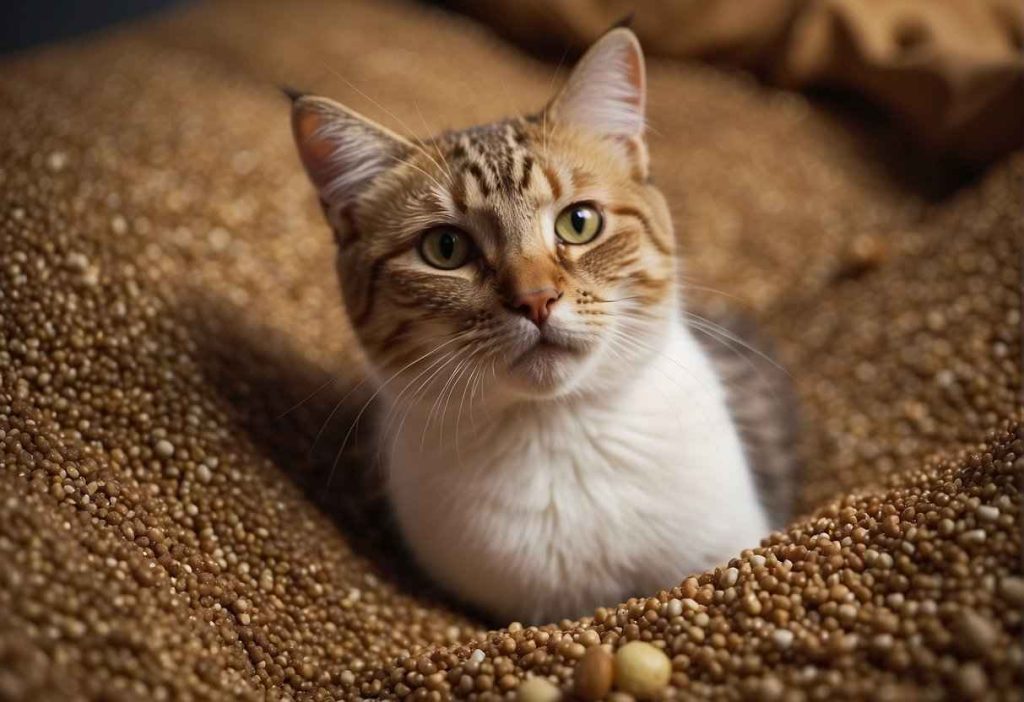
Like many pet products, cat litter does have a shelf life, though it can last quite long if stored properly. Here’s what you need to know to ensure your cat’s litter box is fresh and effective.
Understanding the Basics
Cat litter isn’t perishable like food, but it can degrade in quality over time. Several factors influence its shelf life:
- Type of Litter: Clumping clay litter generally lasts longer than non-clumping varieties.
- Storage conditions: Humidity and moisture can compromise its effectiveness.
- Packaging integrity: A breached bag can lead to spoilage.
Signs Your Cat Litter May Have Expired
Keep your eyes (and nose) on the lookout for these clues:
- Clumping Effectiveness Decline: It might not form those tight lumps you’re used to.
- Reduced Odor Control: Spoiled litter is less effective at keeping that ammonia smell in check.
- Increased Dust and Tracking: More dust might start kicking up when your cat covers their business.
- Visual and Olfactory Indicators: Strange discoloration or a musty odor are definitely red flags.
So, how can you keep your kitty’s bathroom corner top-notch?
- Store it right: Keep your litter in a cool, dry place. (2)
- Check the package: No tears or holes? You’re good to go!
- Stay vigilant: Notice any changes in the litter’s performance. It might be time to replace it.
In addition to considering the shelf life of your cat’s litter, choosing eco-friendly litters can further support your commitment to a sustainable lifestyle, ensuring that your cat’s hygiene practices are not only effective but also environmentally responsible.
Remember, a happy cat means a happy you, and it all starts with a little attention to their litter. Keep it fresh, and those purrs will keep on coming!
Health and Safety Implications of Using Expired Cat Litter
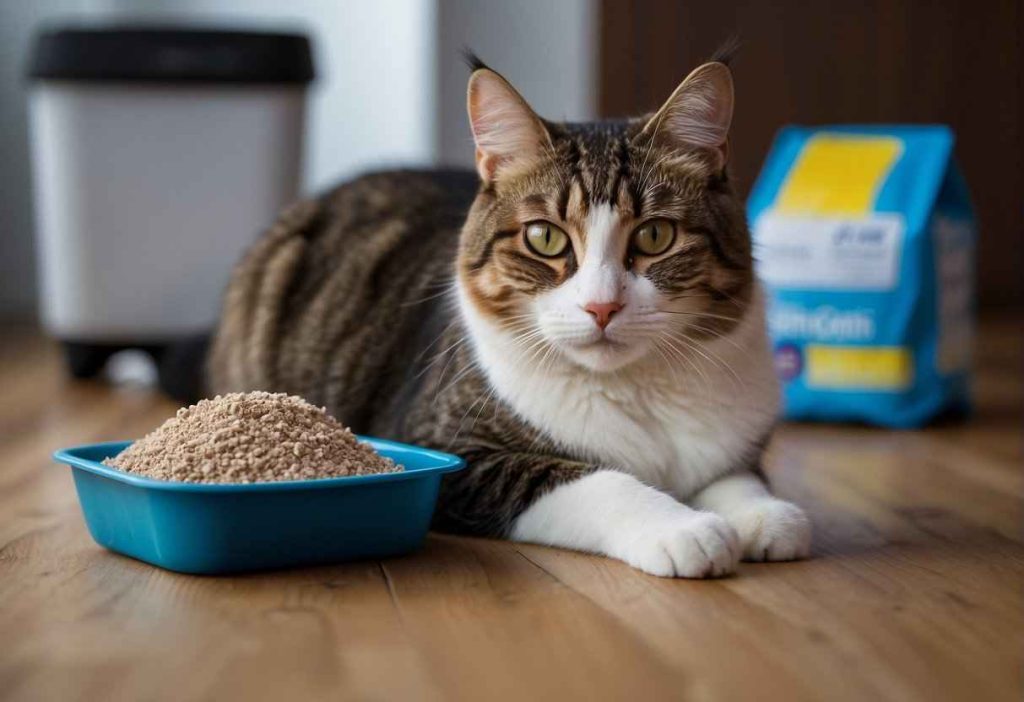
Let’s uncover the nitty-gritty of what happens when cat litter expires and why it matters to your cat’s well-being.
Potential Risks to Cats:
- Ineffective Clumping: Litter that refuses to clump? That’s a sign! It might be past its prime, leaving you with a mess and your cat, a bathroom they’re not too fond of.
- Bacterial Growth: Unfriendly bacteria love a moist environment, which old litter can offer, inviting a host of potential problems. (3)
But wait, there’s more. These aren’t just mess issues. They’re health hazards.
Science Behind Absorption and Odor Control Degradation:
You know the magic that keeps odors at bay?
It’s all science – absorption and odor control agents that get weaker over time, especially if the litter’s been exposed to moisture. (4)
Imagine this: a once ninja-like odor-eliminating litter now barely sneaking up on smells. That can mess with your nose and, more importantly, your cat’s comfort.
Here are quick tips for maintaining a safe and hygienic space:
- Proper storage: Keep it in a cool, dry place.
- Regular checks: Look out for moisture, odd smells, or color changes.
- Prompt replacement: No exact expiry date means it’s your call—better safe than sorry!
Remember these pointers, and you’ll keep your fluffy overlord’s throne both regal and risk-free! Who knew cat litter had such a story, right?
Regularly refreshing your cat’s litter with new, high-quality odor-control litter can significantly reduce the risks of decreased effectiveness over time, ensuring your home stays fresh and hygienic.
So, next time you scoop or restock, give it a second thought for the safety of your purr-pal.
Storing Cat Litter Properly to Extend Shelf Life
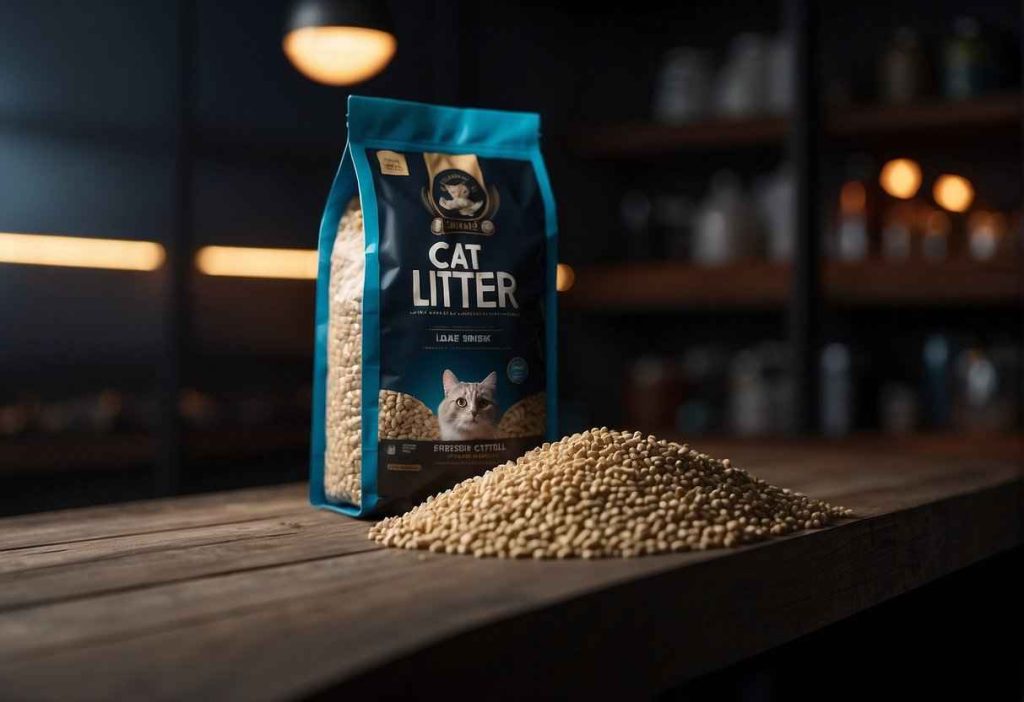
Here’s a little secret: storing cat litter the right way can significantly increase its lifespan. Let’s break down how you can be a storage pro!
Ideal Storage Conditions:
To kick things off, you’ll want to store your litter in a cool, dry place.
Think of it as creating a mini-sanctuary for your cat litter. Why? Moisture is the main enemy of cat litter, leading to clumping and reduced effectiveness before it even hits the litter box.
- Avoid Moisture: It’s all about keeping it dry. Use airtight containers to lock out any sneaky moisture that wants to ruin your cat’s bathroom vibes.
Practical Storage Solutions:
A simple plastic container with a tight-fitting lid can do wonders. If you’re feeling fancy, why not use a storage bin with a pour spout for easy use?
- Seal the Deal: Make sure you’re sealing that bag as if you’re locking away treasure – because to your cat, a clean litter box is a treasure indeed!
Step-by-Step Storage:
- Find the Ideal Spot: Choose a cool, dry area away from direct sunlight.
- Transfer the Litter: If your cat litter came in a flimsy bag, consider a sturdier container.
- Seal It: After use, ensure your container is sealed tight.
- Label It: Keep track of when you opened the litter for the first time.
And there you have it! You’re now ready to extend the shelf life of your cat litter like a champ. Say goodbye to wasted litter and hello to a happy kitty.
Types of Cat Litter and Their Shelf Life
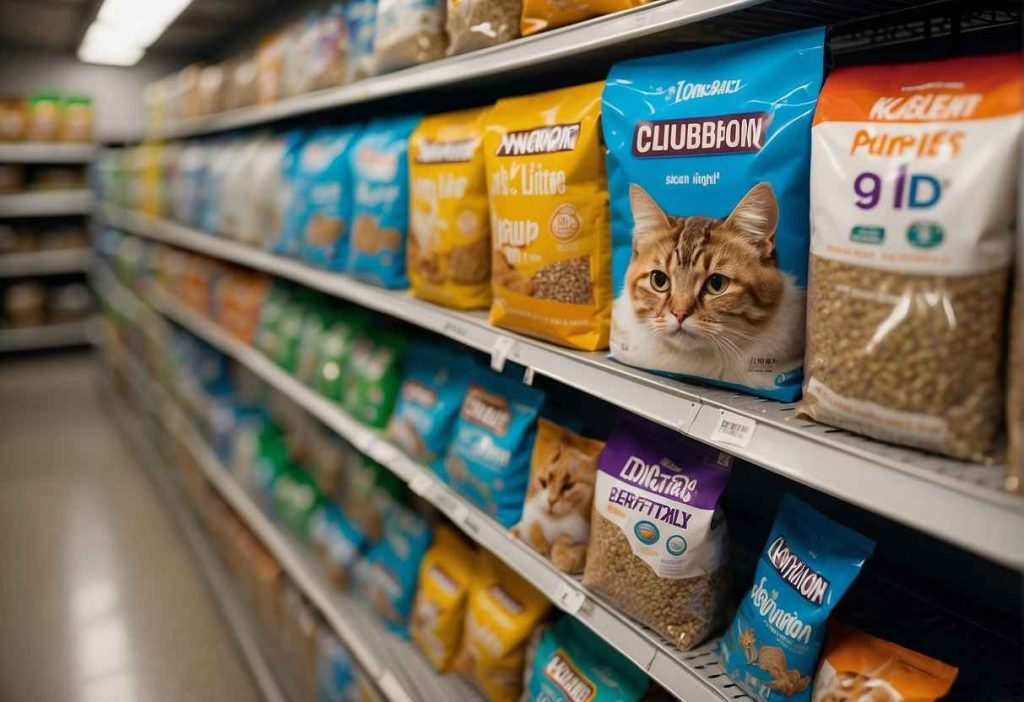
While cat litter typically doesn’t have a strict expiration date, its shelf life can vary depending on the type, materials used, and storage conditions.
Clumping vs. Non-Clumping:
Clumping litters, usually made of bentonite clay, are popular for their ease of scooping. But here’s a fun fact: they tend to last longer than non-clumping varieties.
Non-clumping litters, which are often lighter and come in smaller bags, might not “age” as gracefully due to their composition.
- Clay-Based Litters: These are your tried and true options and are usually quite long-lived when unopened. If stored in a cool, dry place, a good bag won’t lose its effectiveness for a very long time.
- Silica Gel Litters: A high-tech member of the litter family, silica gel litters absorb a great deal of moisture and can also last quite a while if they remain in a sealed bag away from damp environments. (5)
Natural Litters (think wood, corn, paper):
Biodegradable and eco-friendly options may not hold onto their freshness quite as long. Exposure to humidity can break them down faster since they’re made from organic materials. (6)
But as long as you store them right, most have a decent shelf life.
- Recommendations: Looking for a litter that keeps its clumping power and odor control over time? Experts often lean toward clumping clay litters. Always check the packaging for storage instructions to get the most out of your litter.
Enhancing your eco-friendly litter practices with natural litter bags not only complements your choice of sustainable cat litter but also contributes to a greener planet by ensuring responsible disposal
Remember, you want your furry friend’s bathroom to be as fresh as possible. Keep an eye on the litter’s performance, and when in doubt, it’s better to replace it than risk a feline fuss.
Real-Life Cases and Personalized Advice
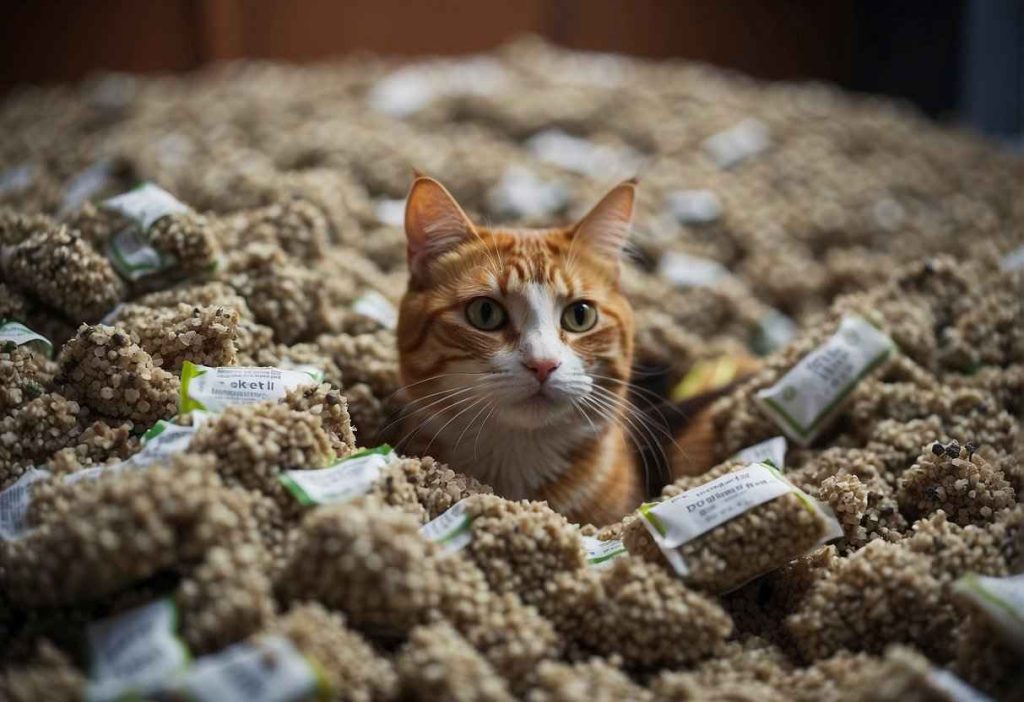
Susan, a cat owner, noticed her cat avoiding the litter box. The culprit? An old bag of clumping litter that had absorbed moisture, reducing its effectiveness.
Susan’s story echoes a common scenario where storage conditions can affect the litter’s performance.
Best Practices for Litter Longevity:
- Storage: Keep it dry and sealed. A cool, dry place prevents moisture, which is a litter’s nemesis.
- Rotation: Use older stocks first. It’s tempting to grab the new package, but first-in, first-out is your mantra.
- Check for Changes: Is it clumping properly? Has the odor control faded? Your cat’s behavior can signal if the litter’s properties are declining.
Here’s What Experts Say:
Veterinarians often advise that while unopened cat litter doesn’t have a strict expiration date, its quality can degrade over time. If you’ve been storing that litter for more than two years, it might be time to reassess.
Visual Aids for Your Convenience:
Why not check out a quick video demonstrating proper storage techniques? Or, glance at an infographic illustrating the signs of expired litter.
Remember, while the kitty litter might not ‘expire,’ its efficacy can diminish.
Keep an eye out, use your senses, and stay proactive in managing your cat’s bathroom needs. It’s the little things that can make a world of difference for your feline friend!
Quick Recap
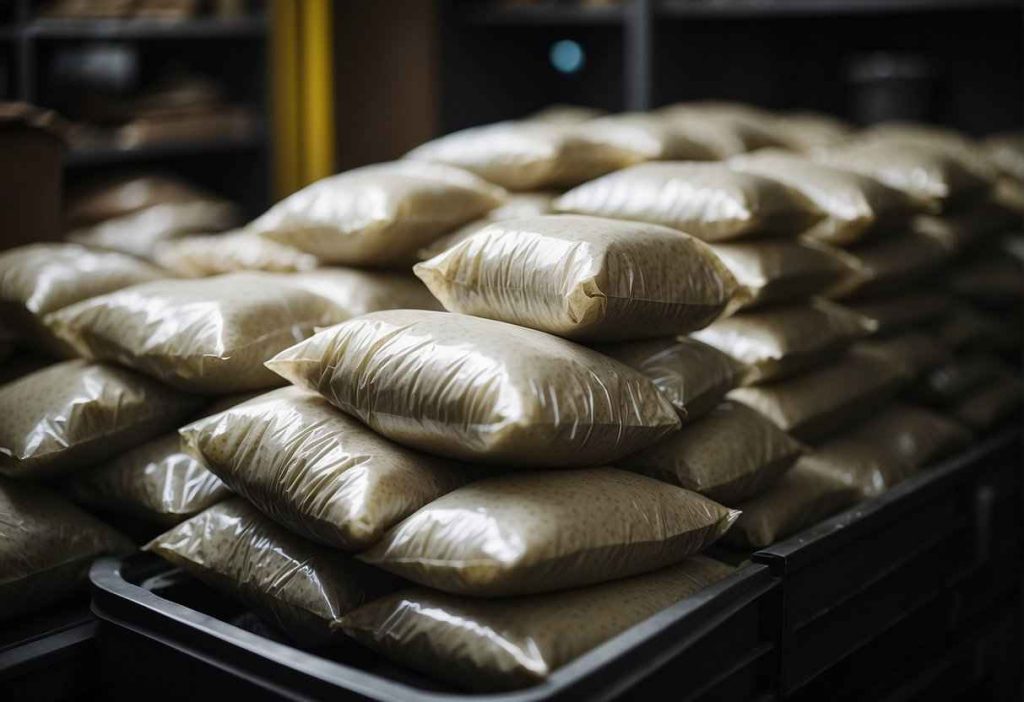
Does cat litter expire? You might be surprised, but yes, it can expire.
While most unopened cat litter can last indefinitely if stored correctly, once opened, environmental factors come into play that can reduce its effectiveness.
- Clay-based litters: These are common and can generally last a very long time. However, the absorbency and odor control can diminish over time, especially if exposed to moisture.
- Silica gel litters: These are highly absorbent and can also have a long shelf life. But with exposure to air, especially humidity, their lifespan can decrease.
- Biodegradable litter: Made from materials like recycled paper or wood, these may be more prone to spoilage than their clay or silica counterparts. (7)
Remember, even with an indefinite shelf life, an open bag of kitty litter won’t perform at its best forever.
Keep an eye out for a few signs that your cat litter may not be at its peak:
- Less effective clumping
- Reduced odor control
- Increased dust or tracking
- Changes in color or scent (if applicable)
It’s simple really, take good care of your cat litter, and it’ll take care of those unpleasant odors and messes!
But, if you’re not sure, why not do a bit of a sniff and sight test? If it seems off, it’s probably time to replace it. Remember, your furry friend’s bathroom should be just as fresh as your own!
Proper storage is key. Keep your cat litter in a cool, dry place to help maintain its quality for as long as possible. Here’s a little cheat sheet:
| Storage Tip | Benefit |
|---|---|
| Keep it sealed | Minimizes moisture and odor |
| Store in a dry place | Prevents clumping and spoilage |
| Avoid extreme temps | Preserves texture and effectiveness |
Caring for your cat means being proactive with their litter too.
So, give your pet the best, and make sure their litter is fresh and up to the task!
Frequently Asked Questions
Navigating the nuances of cat litter shelf life can be puzzling. Let’s tackle some common concerns to ensure your furry friend’s litter box is both safe and effective.
What are the first signs that my cat litter has expired?
If your litter isn’t clumping as it used to or there’s a noticeable change in color, it might be past its prime.
Trust your nose too—a different odor might indicate it’s time to toss it.
Can expired cat litter cause health issues for my cat?
Using expired litter could lead to mold growth or bacteria build-up, risking your cat’s health.
Keep an eye on your litter’s condition to avoid any potential issues.
How can I properly store cat litter to extend its shelf life?
Keep unopened cat litter in a cool, dry place.
Once opened, seal it in an airtight container away from humidity to maximize its lifespan.
Is there a difference in expiration between clumping and non-clumping litter?
Indeed, clumping litter generally lasts longer than its non-clumping counterpart due to the moisture-absorbing agents that help it retain efficiency over time.
How often should I replace my cat litter to avoid using expired product?
Frequent scooping can prolong litter life, but aim for a full replacement every two to four weeks to maintain freshness and hygiene.
- Advantages of Playing Casino Online - July 6, 2025
- How players can take advantage of the no deposit bonus at the Casino - July 5, 2025

